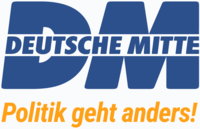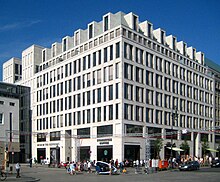German center
| German center | |
|---|---|

|
|
| Party leader | Michael Longerich |
| Secretary General | Georg Heyne and Norman Golisz |
| vice-chairman | Ilona Dittmar |
| Federal Treasurer | Johannes Gerhard Madsen |
| founding | 3rd October 2013 |
| Place of foundation | Berlin |
| Colours) | blue |
| Number of members | 3300 (July 15, 2017) |
| Website | deutsche-mitte.de |

The German center (short name: DM ; additional name: politics goes different ...! ) Is a small party in Germany .
history
The party was founded in 2013 by Christoph Hörstel . The publicist and political activist was federal chairman of the party until October 2017.
For the 2017 federal election, the party used the slogan “Help people - instead of promoting migration ” and was supported by the hip-hop band The Bandwidth . The party could be elected nationwide, with the exception of Hamburg, Saxony, Saxony-Anhalt, Schleswig-Holstein, Rhineland-Palatinate and Mecklenburg-Western Pomerania.
In January 2016, the party announced the entry of its 500th member. Towards the end of the year, the number of party members grew to around 2000, according to the party, and to 3,300 by July 2017.
In November 2017, Hörstel as well as the 2nd federal chairman, the party spokesman for finances and the federal secretary general announced their resignation from their offices and the exit from the party.
In November 2018, all positions on the Executive Board were filled again.
program
According to the Tagesschau "[the party] can be described as critical of Israel". In its foreign policy program, it rejects a German raison d'être for the security of Israel and advocates a one-state solution with full right of return for all Palestinians. In addition, it refuses to participate in combat missions with German soldiers outside the NATO area and wants Germany to leave the Euro Group .
Regarding immigration policy, there are restrictive demands in the party program such as a new law on foreigners with low upper limits. In addition, Deutsche Mitte would like to prevent mass immigration at the external borders through peace policy and political, economic and humanitarian aid in the countries of origin and initial reception, and to reject migrants who are unwilling to integrate. On the other hand, “lawful immigrants” should be better integrated and treated.
The party calls for a simplification and, in the long term, an extensive abolition of the tax system and at the same time wants to promote “alternative and regional currencies” and reintroduce the German mark . It also provides the independence of the media in question, which is why they the financing of public service broadcasting would like to set.
The German center wants to promote families through premiums. It intends to pay out EUR 5,000 for the birth of the first child and EUR 10,000 for the birth of each additional child and to double the child benefit, but only for "intact families in orderly circumstances in which married biological parents raise their own children." Compulsory school attendance for children is to be abolished. The party believes that every able-bodied person has a job and intends to introduce an unconditional basic income exclusively for German citizens after a transition period of 3 to 5 years . During the transition period, there should be a solidarity basic income of around 1,200 euros for charitable work .
In terms of health policy, the party opposes “overpriced antitrust medicine”. It strives for "free basic medical care for everyone" and the recognition of "holistic" methods . The German center is opposed to vaccinations and wants to end the "vaccination bullying". She sees the “real causes of illness” in pesticides, environmental and drug poisons, electrosmog, junk food and air pollution, for example .
In addition, Deutsche Mitte rejects gender mainstreaming and demands the "disclosure of secret documents, for example about espionage, new technologies and extraterrestrial life ".
Political classification
The rhetoric and the program of the DM contain populist elements and, according to TAZ, among other things , conspiracy-theoretical and right-wing positions reminiscent of Reich citizens , such as an alleged lack of sovereignty in Germany, as well as ideas from the founder of anthroposophy Rudolf Steiner .
Benjamin Steinitz from the Anti-Semitism Research and Information Center (RIAS), which is funded by the Berlin Senate , classifies the German center, which he observed at the Berlin Al-Quds March 2017, as a “ right cross front party”. According to the Hamburg state coordination office of the advisory network against right-wing extremism , which is part of the Johann Daniel Lawaetz Foundation , the party tried in 2017 "under the umbrella of the Hamburg peace movement [...] to spread anti-Semitic attitudes on the Hamburg Easter March ".
Organization, structure
The structure of the German Center is, as prescribed by the political party law, classically organized into the board, sub-associations, regional associations and their chairmen.
Federal Executive
Federal Chairman is Michael Longerich, Deputy Federal Chairman is Dieter Wolter, General Secretary is Georg Heyne, General Secretary IT Norman Golisz and Federal Treasurer Johannes Gerhard Madsen. The federal board also includes Pavel Procházka, Heiko Harmsen, Stephan Haube, Oliver Schneemann, Stephan Neuhaus and Mike Schulte as assessors .
Regional associations
| Regional association | Establishment date | Chairman |
|---|---|---|
|
|
20th November 2016 | Klaus Schoeffler |
|
|
October 16, 2016 | Jörg Lindner |
|
|
February 11, 2017 | Axel Knaak |
|
|
19th February 2017 | Paul Schlagheck |
|
|
April 25, 2017 | Kornelius Neuhof |
|
|
19th November 2016 | Andreas Höhn |
|
|
December 18, 2016 | Mathias Lenz |
|
|
15th November 2016 | Oliver Snowman |
|
|
15th January 2017 | Sandro Jablonski |
|
|
4th December 2016 | Reinhard Wirth |
Web links
Individual evidence
- ↑ a b Party website: DM - a party that can be voted for by Muslims? ( Memento from August 31, 2017 in the Internet Archive ), July 15, 2017
- ↑ Deutsche Mitte, imprint
- ↑ Party documents on the website of the Federal Returning Officer , as of June 13, 2017, accessed on August 19, 2017 (PDF; 724 kB).
- ↑ a b Bundestag election service: Deutsche Mitte - Die Wahrhaftigen , by J.-P. Baeck, taz .archiv; accessed on August 30, 2017
- ↑ a b c d e f Small parties in the election - visions of the “others” 20/27 “Deutsche Mitte” on tagesschau.de , as of August 28, 2017, 4:45 pm, accessed on August 29, 2017.
- ↑ Deutsche Mitte welcomes its 500th member! - and more good news! ( Memento from August 20, 2017 in the Internet Archive ) DM, January 27, 2016.
- ↑ Deutsche Mitte reaches 2,000 members! - now it's time to get started right! DM, November 24, 2016.
- ↑ We stick together. Deutsche Mitte, November 2, 2017, accessed on November 3, 2017 .
- ↑ a b c d e f g German Center Party on the website of the Federal Agency for Civic Education ; accessed on August 30, 2017
- ↑ a b c d Lausitzer Rundschau: 19 parties are available for election in Saxony, 15 in Brandenburg. In: lr-online.de. Retrieved August 29, 2017 .
- ^ "Deutsche Mitte" and "Dierechte" The right wing parties are so radical , on t-online.de , September 8, 2017; accessed on September 9, 2017
- ↑ Bundestag election 2017: The exotic ones in the election - German center - sometimes left, sometimes right on web.de ; accessed on September 18, 2017
- ↑ Bundestag election 2017 - So surprising are the economic programs of the small parties in Focus Online Money ; accessed on September 18, 2017
- ^ The election program in the check: Others in the Weser-Kurier ; accessed on September 18, 2017.
- ↑ Philipp Peyman Engel: "Accelerator for the abolition of Israel". In: juedische-allgemeine.de . July 3, 2017. Retrieved August 19, 2017 .
- ↑ From the Mobile Consulting Team project. (PDF) In: Newsletter 2017. Hamburg state coordination office of the advisory network against right-wing extremism at the Johann Daniel Lawaetz Foundation , p. 4 , accessed on August 26, 2017 .
- ^ Federal Board , DM; Retrieved August 19, 2017.